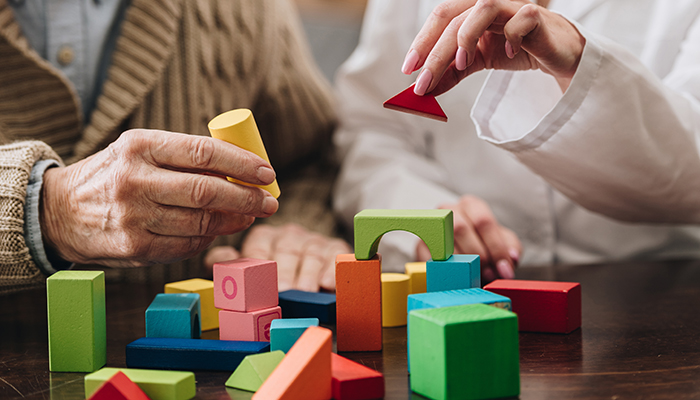The Caregiver Coach
Helpful tips for family caregivers
December 2020/January 2021
As we close out 2020, we chose to reflect on safety and on positive actions to counteract the many unexpected setbacks of 2020.
In that light, we offer suggestions for evaluating the wisdom of postponing procedures that are not currently urgent against the potential price of delay. It’s important to look at all the consequences of action and inaction, and to pay attention to local restrictions which can change at a moment’s notice.
And to honor the holidays, when many families may decide it’s unwise to travel, we suggest an intergenerational activity of a remote video interview with the help of StoryCorps, a project of the American Folklife Center at the Library of Congress.
Last, we look for inspiration in the teachings of Maria Montessori. People with dementia have suffered significant decline because of the isolation imposed by COVID-related safety requirements. Dr. Montessori’s simple activities can be applied to brighten the day—even several times a day—of your loved one with moderate-to-advanced dementia.
Share Page: [addtoany]
- "Should we delay that procedure?"
- Leaving a legacy with StoryCorps
- Montessori for people with dementia
"Should we delay that procedure?"
 Should your loved one go ahead with cataract surgery? What about a hip replacement? Dental work? A cardiac stress test?
Should your loved one go ahead with cataract surgery? What about a hip replacement? Dental work? A cardiac stress test?
In light of COVID, other health issues seem to pale. But putting off treatment or tests can result in tough consequences down the line.
How do you know which procedures are worth the risk?
Consider the following:
Is your loved one especially high risk? In addition to advanced age, high risk includes those who are obese or smokers, or who have cancer or a heart, lung, or kidney condition.
Is your relative’s town a “hot-spot”? Check current statistics and restrictions. If local transmission rates are high, best to wait.
Is the condition “urgent”?
- Pain or infection. Pain is usually a sign of trouble, often an infection. Left untreated, infections can spread and even trigger sepsis, a potentially life-threatening condition.
- Danger if you wait. Ask about the risks of doing nothing. Would delay cause lasting damage? Increase surgical complications?
- Risk to independence. Could waiting affect your relative’s ability to live on their own? Getting cataracts removed may be more urgent if your loved one is falling or cannot drive safely.
- Ability to participate. For those with dementia, waiting could result in more problems later because of reduced ability to participate or cooperate with the procedure.
How is risk reduced? What protections are in place on the provider side? Is a negative COVID test required before a procedure? Can that hip replacement be done as an outpatient surgery with recovery at home?
What about precautions afterward? Following a procedure, your relative may be considered a virus risk to others. Rehab or an assisted living facility may require a 10- to 14-day quarantine after discharge from the hospital. Are you and your loved one prepared to address this kind of isolation?
Return to topLeaving a legacy with StoryCorps
 The desire to leave a legacy calls strongly to many older adults. Perhaps this is of interest to an elder in your family. A legacy does not have to be financial in nature. One way to leave a legacy is to record a personal story and bequeath its insight to future generations.
The desire to leave a legacy calls strongly to many older adults. Perhaps this is of interest to an elder in your family. A legacy does not have to be financial in nature. One way to leave a legacy is to record a personal story and bequeath its insight to future generations.
StoryCorps, a project of the American Folklife Center at the Library of Congress, makes this possible. It holds a collection of more than 300,000 recorded conversations. And it wants to hear from our nation’s elders.
The StoryCorps “Connect” project involves 40-minute remote video interviews. This is ideal for a grandchild and grandparent. All that is needed is for both parties to have a computer with a microphone, a tablet, or a smartphone. (Check on the need for technology help beforehand.)
At StoryCorps.org you can find interview tips and suggested questions. At the end of the interview, you can even upload photos with the recording to the Library of Congress. Go to https://archive.storycorps.org/ to open a free account and set up a video interview.
StoryCorps recommends preparing ahead of time. Each person should be in a quiet room, uninterrupted. Figure on four to eight open-ended questions. But if something unexpected and interesting emerges, be willing to switch course.
Questions can run the gamut.
- What are you most proud of?
- When did you feel most uncertain and what helped you cope?
- What do you feel most grateful for?
- How has your life been different than you imagined?
- Who was a big influence in your life and in what way?
- If you could hold on to one memory in your life, which one would it be and why?
This holiday season, consider inviting a young person in your family to uncover a “conversation of a lifetime.” Your loved one may relish the exchange and enjoy contributing to our national archive of American stories.
Return to topMontessori for people with dementia
 Caring for a loved one with moderate-to-advanced dementia often leads to bewilderment. And sadness. Perhaps your relative seems withdrawn. Or is fidgety, pacing, or wandering. They may seem to recede each day.
Caring for a loved one with moderate-to-advanced dementia often leads to bewilderment. And sadness. Perhaps your relative seems withdrawn. Or is fidgety, pacing, or wandering. They may seem to recede each day.
How can you connect with them now? How can you keep them engaged?
Experts in dementia care are culling tips from pioneering educator Maria Montessori’s work with very young children. She developed activities aimed at meeting the individual’s interests and abilities. Activities that are enjoyable and stretch the mind without overwhelming.
Well-matched activities for persons with dementia generate positive feelings and have been shown to reduce agitation and other problem behaviors. People with dementia need pleasure and purpose too!
To engage your relative in a Montessori way, think about activities that stimulate the mind and/or body or senses. Then consider your loved one’s past lifestyle and hobbies. Did they involve
- home. Activities might include setting the table. Folding towels and napkins. Matching socks. Caring for a doll. Arranging flowers. Peeling potatoes. Stirring a mix.
- office. Provide a briefcase, paper and pens, file folders. Supply a newspaper or magazine, and if safe, blunt scissors to “cut out interesting articles.”
- garage. Ask your relative to “do you a favor” and sort items, maybe buttons from screws. Give sandpaper and blocks of wood. Provide a junk gadget that can be taken apart “for repair.” Avoid small objects if your relative tends to put things in their mouth.
- exercise and/or outdoors. Kick a beach ball back and forth. Toss beanbags at a target. Sweep. Rake. Load a wheelbarrow and move things.
- games. Try easy jigsaw puzzles or building blocks. Match colors or numbers on poker chips, dominoes, or cards.
If an activity seems a fit, don’t hesitate to try it again soon. Chances are your relative won’t remember they’ve done it recently.
Return to top
